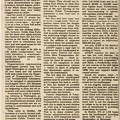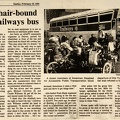Handicapped Coloradan, vol 7 no 5, December 1984
[Headline] ADAPT HEADS FOR SAN DIEGO
The executive board of the American Public Transit Association (APTA) has agreed to vote on a resolution calling upon the nation’s transit systems to provide accessible mainline bus service.
That vote will take place when the executive board meets in San Diego Feb. 9 or 10. Wade Blank, a spokesperson for the group pressuring APTA to endorse the resolution, said he expects that the APTA board will summarily vote it down.
Two years ago the American Disabled for Accessible Public Transit (ADAPT) put such a resolution before the national convention of APTA when it met in Denver. While APTA allowed the presentation, it refused to vote on the resolution.
Twenty-eight ADAPT members were arrested for civil disobedience outside the convention hall when APTA met in Washington, D.C., in October 1984.
Following that convention, ADAPT asked new APTA chairman Warren Frank, director of the Syracuse, N.Y., transit system, for a meeting to discuss accessibility.
Frank responded by reiterating his opposition to mandatory accessibility. “The transit industry has thoroughly studied the matter and as a result strongly endorses current federal requirements which provide the flexibility for each local community to meet the needs of their handicapped citizens with specialized services or full accessibility or a combination of both," Frank said in a letter to Blank dated Nov. 2.
Blank wired this response: “Your letter . . . is a sign of your bad faith and lack of moral resolve when it comes to the rights of disabled people. To offer us a statement of APTA's policy toward the disabled citizen and indicate your unwillingness to be flexible is no different than Governor Wallace standing in the doorway to prevent blacks from integrating."
The telegram concluded with a warning that ADAPT would show up at the Western Regional Convention of APTA in San Antonio, Tex., April 20-24.
Frank finally agreed to meet with representatives of ADAPT in Chicago Dec. 6. Frank was accompanied by APTA attorney Robert Batchelder and executive vice president Jack R. Gilstrap. Gilstrap, who runs the daily APTA operations, has been the target of a number of vocal attacks by ADAPT members.
"For the first time Jack Gilstrap actually shook my hand and smiled at me," Blank said after returning from the Chicago meeting.
APTA agreed to allow ADAPT to make a 20-minute presentation of the merits of accessibility at the San Diego board meeting. APTA further agreed to provide the names and addresses of board members so that ADAPT could lobby them in advance of the meeting.
ADAPT has said it will cancel the demonstration in San Antonio in the unlikely event the APTA board supports mainline access in all cities.
In the meantime, ADAPT has continued working on plans for the San Antonio convention. Organizers believe the smaller nature of that regional convention will make it easier for them to disrupt it.
Blank said ADAPT intended to be at every APTA meeting until they agree to total accessibility.
ADAPT is still working with Rep. Pat Schroeder's (D-Colo.) office on a fundraiser to help pay the bond money for the 28 demonstrators arrested in Washington during the October APTA convention.
The Washington chapter of ADAPT has pressured the Washington Metropolitan Area Transit Authority (WMATA) board of directors to establish a policy that all newly purchased buses will be equipped with wheelchair lifts. WMATA was to vote on that resolution Jan. 10.
- Created on
- Thursday 11 July 2013
- Posted on
- Thursday 10 December 2015
- Tags
- ADAPT - American Disabled for Accessible Public Transit, APTA - American Public Transit Association, civil disobedience, Jack Gilstrap, local option, Rep. Pat Schroeder, resolution, Robert Batchelder, Syracuse, vote, Wade Blank, Warren Franks, Washington ADAPT, Washington DC, WMATA - Washington Metropolitan Area Transit Authority
- Visits
- 2456
- Rating score
- no rate
- Rate this photo


0 comments